Eyes of Fire, Cat on the Brain, Reflecting Skin....clearly someone knows how to live a full and rewarding life.
The deadline for the Top 90s Films Redux List is TOMORROW! Submit your ballot now, or read about it here
My 2025 Watchlist Frenzy!
→ in Movie Reviews
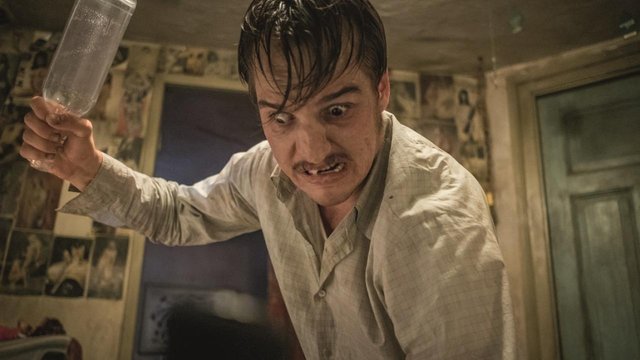
THE GOLDEN GLOVE (2019)
Directed by : Fatih Akin
You need a lot of resilience to endure the ugliness of The Golden Glove - we're deposited into the dirty toilet bowl of humanity and remain ensconced in there for the duration. This is a true story about German serial killer Fritz Honka (Jonas Dassler) - far from a criminal mastermind, he never could sort out a good system for the disposal of the mounting bodies that populated his apartment. Instead, he cut them up with a saw, and stuck arms, legs, heads and torsos into taped up cupboards - along with a generous helping of pine scented air fresheners which did absolutely nothing to hide the foul stench which occupied his living quarters. An alcoholic whose face had been badly mangled in a car accident when he was 21-years-old, Honka preyed on those who were equally lost to the bottle - prostitutes in their 50s who were easily lured by promises of more booze. His hang-out was a pub called The Golden Glove, populated by the foul - yet sometimes surprisingly funny - bottom-of-the-barrel filth that appear to have made a pact with the devil, losing themselves in the process. One one-eyed patron, known as Soldaten-Nobert (Dirk Böhling) was wounded during the war while fighting with the Waffen SS - he delights in urinating all over a quiet soft-spoken young man, showing utter contempt for anything clean and wholesome.
As far as anti-heroes go, the Fritz Honka we get in The Golden Glove is kind of fascinating. Rarely do you see someone so ugly inside and out - and that's beautifully illustrated when, sitting at the bar and getting very drunk, he offers to buy a drink for one lady after another - working his way down from the most attractive to the least until he snags the veritable old ogre in the corner, Gerda Voss (played wonderfully by Margarethe Tiesel). Fritz Honka is immediately abusive and obstreperous, simply wanting to use Gerda sexually in a rough, uncaring and uncompromising manner - which she's willing to accept in order to keep the booze flowing. Jonas Dassler plays Honka as an Igor/Renfield come to life in the real world - his slurred speech, made all the worse due to his drinking, has a nasal tone to which a fair dose of saliva is added. He's crude, and uncompromising in his lack of empathy or the callous way he gets right to the point (he tells Gerda outright that he wants her to bring her daughter around so he can forcibly have sex with her.) It's a character so complete that when Honka tries to turn over a new leaf when starting a new job - detoxing, getting off the booze and being polite just makes him look faintly ridiculous. He's about as far as a human being can fall - too evil to be anything fictional.
I'd imagine there's a fair proportion of people out there who won't be able to take The Golden Glove's grim, despairing, violent aura - this is a movie where even the serial killer's victims have already been crushed by a lifetime of abuse, and have devolved into foul, wretched creatures. To even be exposed to this world for just under two hours can fill you with a dismal apathy and generally negative outlook on the world in general until you gradually recover your senses. What shook me the most was the discovery, at film's end, that this was a true story - we're shown a photograph of the real Fritz Honka, and the various news articles and such which detailed his crimes. Fatih Akin has faithfully reproduced the man's apartment, and what I'm reminded of most is Richard Fleischer's 10 Rillington Place - John Christie and Fritz Honka both being as unsavoury as the other in their inability to dispose of the corpses befouling their properties. Most everything in The Golden Glove gives you cause to blanch, reminding you of how seedy an underbelly there is out there in the dark recesses of low-rent bars and pornography-clad bachelor dens. Steel yourself, if you intend to take it all in.
Glad to catch this one - nominated for the Golden Bear at the Berlin International Film Festival. Tellingly, it ended up winning "Most Shocking Film" at the Splat! Filmfest Awards ceremony - you were warned.
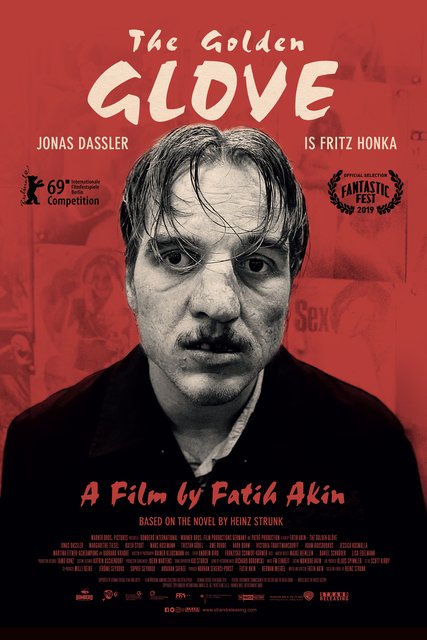
Watchlist Count : 455 (+3)
Next : The Blackcoat’s Daughter (2015)
Next : The Blackcoat’s Daughter (2015)
Thank you very much to whomever inspired me to watch The Reflecting Skin
__________________
Remember - everything has an ending except hope, and sausages - they have two.
Latest Review : Before the Rain (1994)
X
Favorite Movies
X
User Lists
The Blackcoat's Daughter is very good, but it's the kind of film which needs to be watched at least twice to fully appreciate it given its plot structure and the significance of certain details aren't made clear till the ending. It's similar to Arrival in that sense.
X
Favorite Movies
X
User Lists
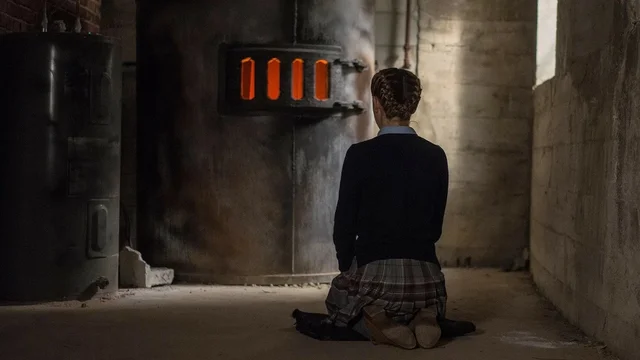
THE BLACKCOAT'S DAUGHTER (2015)
Directed by : Osgood Perkins
You can think of The Blackcoat's Daughter as a bit like if an Ari Aster-type horror filmmaker (ie - Osgood Perkins) were to make his own twisted version of The Holdovers. A sense of dark foreboding looms like an impending nightmare over it's duration. Two students at a prestigious prep school, Bramford Academy, are left in the wake of a general exodus during a week-long break. Rose (Lucy Boynton) fears she might be pregnant, and misrepresents the date her parents are meant to come pick her up - just so she gets an extra day to try and work everything out with the guy who would be the father. Katherine (Kiernan Shipka), meanwhile, is an increasingly weird and unearthly girl whose parents simply haven't arrived - she's dreamed their death, and all attempts to contact them are proving unfruitful. As their time in the deserted Academy continues, Rose starts to grow increasingly fearful of Katherine, who is behaving more and more strangely. In the meantime, the film eventually begins a new plotline - one in which a young escapee from a mental institution, Joan (Emma Roberts), accepts a ride from two strangers, Bill (James Remar) and Linda (Lauren Holly), who are heading to Bramford. Something horrifying is on it's way.
What The Blackcoat's Daughter (or February, which was the film's original title) does really well is build up a sense of intense dread. It does this with the aid of an excellent, eerie score by Elvis Perkins' (yes, Osgood's brother - another son of Anthony Perkins) and with frequent tiny reveals that never give away the full picture. We know something is wrong with Katherine, and we see her early in the film in the company of a black-clad figure who shows her the fate of her parents. What it is exactly that's going on with her is harder to tell - she feels sick, and she often speaks cryptically, seemingly on another wavelength to everyone else. In the meantime Joan has flashbacks to a moment in her past when she was shot by police, and uncomfortably co-exists with the two older people who insist on helping her get to where she wants to go. What it's all leading to is something that manages to be weird and horrific enough to satisfy anyone hoping that this will be a good, unsettling movie, and it reveals a picture that's both disturbing and extremely satisfying. There's very good storytelling employed here, in regards to pacing especially. I found the atmosphere stayed with me long after the movie ended.
I only got to see my first Osgood Perkins film last year when I saw Longlegs on the big screen, and I have to say The Blackcoat's Daughter, while having similar themes, is the superior one out of those two. I hope many more people go back to see this movie after the success Perkins has had with Longlegs - it makes a good companion piece really, and allows those who are a little on the fence regarding that recent film give this filmmaker the benefit of the doubt. It was really nice to see a movie be so enjoyable simply because of the atmosphere it created, and then be witness to a finale that really lived up to that foreboding - perhaps even exceeding our fears and anxieties. You don't really get the absolute full picture until the very last scene, and once there I felt like I'd watched something where all the pieces fit together in an unexpected way, and also in an original way. One where many of the brief moments I'd seen on the way to the film's finish took on a much larger significance in relation to what it was all about. It will be interesting to see this movie again, knowing full well what each of these moments mean in context with the story as a whole - and they were eerie enough the first time around.
Glad to catch this one - although this was Osgood Perkins' debut feature film, it only received a wide release after his 2016 film I Am the Pretty Thing That Lives in the House was shown.
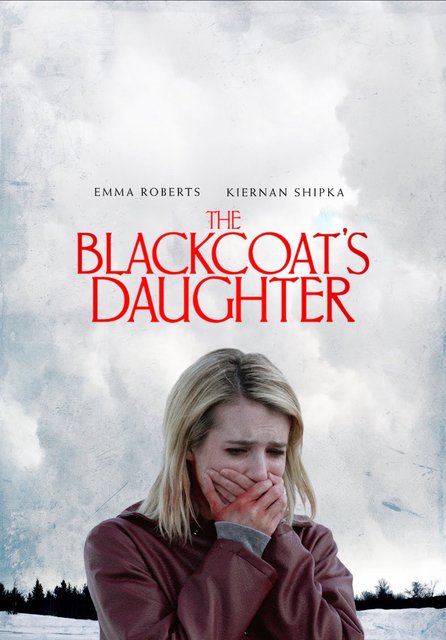
Watchlist Count : 454 (+2)
Next : Demons (1985)
Next : Demons (1985)
Thank you very much to whomever inspired me to watch The Blackcoat's Daughter
X
Favorite Movies
X
User Lists

THE BLACKCOAT'S DAUGHTER (2015)
Directed by : Osgood Perkins
You can think of The Blackcoat's Daughter as a bit like if an Ari Aster-type horror filmmaker (ie - Osgood Perkins) were to make his own twisted version of The Holdovers. A sense of dark foreboding looms like an impending nightmare over it's duration. Two students at a prestigious prep school, Bramford Academy, are left in the wake of a general exodus during a week-long break. Rose (Lucy Boynton) fears she might be pregnant, and misrepresents the date her parents are meant to come pick her up - just so she gets an extra day to try and work everything out with the guy who would be the father. Katherine (Kiernan Shipka), meanwhile, is an increasingly weird and unearthly girl whose parents simply haven't arrived - she's dreamed their death, and all attempts to contact them are proving unfruitful. As their time in the deserted Academy continues, Rose starts to grow increasingly fearful of Katherine, who is behaving more and more strangely. In the meantime, the film eventually begins a new plotline - one in which a young escapee from a mental institution, Joan (Emma Roberts), accepts a ride from two strangers, Bill (James Remar) and Linda (Lauren Holly), who are heading to Bramford. Something horrifying is on it's way.
What The Blackcoat's Daughter (or February, which was the film's original title) does really well is build up a sense of intense dread. It does this with the aid of an excellent, eerie score by Elvis Perkins' (yes, Osgood's brother - another son of Anthony Perkins) and with frequent tiny reveals that never give away the full picture. We know something is wrong with Katherine, and we see her early in the film in the company of a black-clad figure who shows her the fate of her parents. What it is exactly that's going on with her is harder to tell - she feels sick, and she often speaks cryptically, seemingly on another wavelength to everyone else. In the meantime Joan has flashbacks to a moment in her past when she was shot by police, and uncomfortably co-exists with the two older people who insist on helping her get to where she wants to go. What it's all leading to is something that manages to be weird and horrific enough to satisfy anyone hoping that this will be a good, unsettling movie, and it reveals a picture that's both disturbing and extremely satisfying. There's very good storytelling employed here, in regards to pacing especially. I found the atmosphere stayed with me long after the movie ended.
I only got to see my first Osgood Perkins film last year when I saw Longlegs on the big screen, and I have to say The Blackcoat's Daughter, while having similar themes, is the superior one out of those two. I hope many more people go back to see this movie after the success Perkins has had with Longlegs - it makes a good companion piece really, and allows those who are a little on the fence regarding that recent film give this filmmaker the benefit of the doubt. It was really nice to see a movie be so enjoyable simply because of the atmosphere it created, and then be witness to a finale that really lived up to that foreboding - perhaps even exceeding our fears and anxieties. You don't really get the absolute full picture until the very last scene, and once there I felt like I'd watched something where all the pieces fit together in an unexpected way, and also in an original way. One where many of the brief moments I'd seen on the way to the film's finish took on a much larger significance in relation to what it was all about. It will be interesting to see this movie again, knowing full well what each of these moments mean in context with the story as a whole - and they were eerie enough the first time around.
Glad to catch this one - although this was Osgood Perkins' debut feature film, it only received a wide release after his 2016 film I Am the Pretty Thing That Lives in the House was shown.
[center]

Thank you very much to whomever inspired me to watch The Blackcoat's Daughter
My recollection of it is that I loved the dread but the finale was exactly what it seemed it was going to be from the start (at least the start where those characters are introduced) and yet didn't really come together that well so I was left having enjoyed the time spent but felt unsatisfied and wishing it had been better constructed.
Perhaps a re-watch will improve this, it sounds like it did work in your estimation so maybe a revisit will clear things up.
Golden Glove, Blackcoat's Daughter, the hits continue.
Golden Glove might be one of the best 'extreme' pictures I've seen in years. And Blackcoat is easily one of the best horror's of the last ten years.
Golden Glove might be one of the best 'extreme' pictures I've seen in years. And Blackcoat is easily one of the best horror's of the last ten years.
X
Favorite Movies
X
User Lists
I need to watch this again. It's been a long time.
My recollection of it is that I loved the dread but the finale was exactly what it seemed it was going to be from the start (at least the start where those characters are introduced) and yet didn't really come together that well so I was left having enjoyed the time spent but felt unsatisfied and wishing it had been better constructed.
Perhaps a re-watch will improve this, it sounds like it did work in your estimation so maybe a revisit will clear things up.
My recollection of it is that I loved the dread but the finale was exactly what it seemed it was going to be from the start (at least the start where those characters are introduced) and yet didn't really come together that well so I was left having enjoyed the time spent but felt unsatisfied and wishing it had been better constructed.
Perhaps a re-watch will improve this, it sounds like it did work in your estimation so maybe a revisit will clear things up.
WARNING: spoilers below
Joan/Katherine had a specific goal in mind when murdering Rose's parents the way she does - wanting to re-establish the connection she had with the demonic entity. Her turmoil ended up exhibiting a really strange kind of grief - not remorse, but regret that the connection had been severed. It was chilling how she still craved what to us looks like something you'd want to get away from and scrub from your mind. I mean, who'd want that? She desired being possessed in that way. For me it was the perfect way to emphasise just how unsettling the story had been up to that point. Even if something supernatural was going on, there was something terribly wrong with that girl.
I hope a second viewing makes a difference - I hear that there are quite a few people who had to watch this a second time for it to really work for them.
X
Favorite Movies
X
User Lists
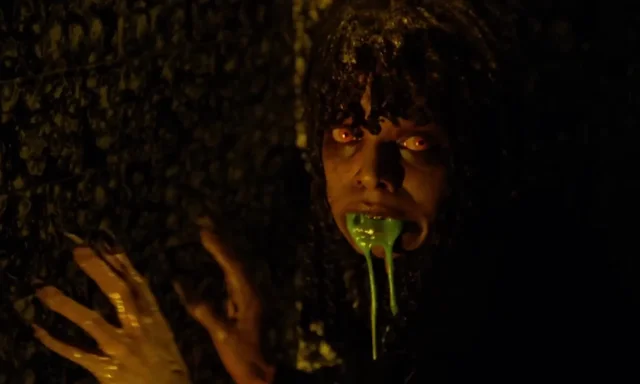
DEMONS (1985)
(Dèmoni)
Directed by : Lamberto Bava
We're getting right down to the nitty-gritty with Lamberto Bava and Dario Argento's Demons - this isn't a film about the disparity between the rich and poor, the meaning of life or how power corrupts. People are turning into monsters and killing other people and/or turning them into monsters. Demons are being brutally slain, and regular people are being gored, stabbed, bitten and ripped apart. Period. It all takes place in a movie theater, the Metropol, which has been recently renovated and is showing a movie about people being turned into monsters and killing other people - in pretty much the same way it happens to the audience. It all starts when Rosemary (Geretta Giancarlo), a prostitute who has come to watch a movie with a fellow-hooker and her pimp Tony (Bobby Rhodes), tries on a silver mask she finds in the cinema lobby which scratches her. The scratch starts to bubble and ooze and soon Rosemary is a disgusting demonic monster who attacks everyone she comes across. In a surprisingly short amount of time, the entire cinema is engulfed in utter chaos as violence and gore overwhelms everyone. Our main two survivors are George (Urbano Barberini) and Cheryl (Natasha Hovey) - will they survive the night?
The special make-up effects in this movie (from Sergio Stivaletti) are the main attraction - I always find that it's something that money can't buy. You need dedication. Time, care and attention are paid to ooze, bursting pustules, bloody wounds, grotesque deformity and sickening sores - with the glowing eyes the demons have from a distance a nice touch. I prefer demons to zombies as demons have much greater scope as to the limitless transformations their appearance can undergo - but I hear a lot of people compare Demons to George A. Romero's zombie movies, mostly because this is a film about a group of strangers having to unite together to fend of hordes of monsters in an enclosed space. I was more reminded of the Evil Dead films - a mysterious power infecting any and all it comes into contact with. Of course, The Evil Dead establishes it's lore with an ancient book and incantations - while Demons is a little more vague as to the source of all the trouble. Apparently the theater itself may be cursed - it's presided over by a silver-masked individual, and it's a silver mask which gets everything moving while a mask in the move-within-a-movie is what sets off chaos. In that the tomb of Nostradamus are what the characters are looking for - but that seems to make less sense, not add clarity. Clearly, the mythos central to Demons isn't all that important.
I'm pretty sure that there was a time in the distant past when I watched Demons previously, with only the barest of outlines remaining in my memory. It's a fun movie in an anything goes kind of way. I mean, why was there a motorbike and katana in the lobby of the cinema? Surely those incongruent items were there simply for George to grab and use gloriously - he rides throughout the place swinging that sword like there's no tomorrow, befitting a film as crazy as this. At one stage, for no reason whatsoever, a helicopter crashes through the ceiling of the main auditorium. How else were those writing the screenplay going to create a hole in the ceiling for our main characters to climb through? Somehow, during the film, all of the exits and entrances to the place have been bricked up - anything can happen when you're in the God-like position of writing the story. There's no need to explain as long as there's a steady supply of blood and horror. Turns out the visceral gruesomeness and action are so befitting and enjoyable that most of us welcome the insanity, making Demons one of those films that most resembles a carnival ride - it's a formula hard to get just right, so hats off to this Italian horror movie.
Glad to catch this one - Demons has a surprisingly good soundtrack which includes music from Motley Crue, Billy Idol, Go West, Saxon and Rick Springfield.
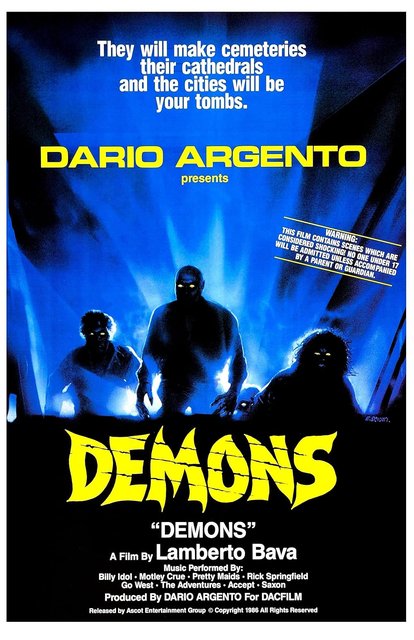
Watchlist Count : 453 (+1)
Next : Demon (2015)
Next : Demon (2015)
Thank you very much to whomever inspired me to watch Demons
X
Favorite Movies
X
User Lists
Only film I’ve seen from Akin is In The Fade which I liked well enough.
Demons is a film that’s looks cool but fell flat for me.
Demons is a film that’s looks cool but fell flat for me.
X
Favorite Movies
X
User Lists

DEMON (2015)
Directed by : Marcin Wrona
History looms over Marcin Wrona's Demon - crying out from beyond the grave despite a persistent need for many well-to-do Polish people to quietly ignore it. It seeps into a Polish wedding in this film, revealing attitudes and unearthing a long lost community that disappeared almost overnight - the Jewish population of a quiet country town that no longer existed after the Second World War came and went. Piotr (Itay Tiran) is an outsider and unknown to his soon wife-to-be Żaneta's (Agnieszka Żulewska) family - but they welcome him nonetheless, and endow him with a ramshackle rural estate which he intends to transform. While using the digging equipment with which he's to do this, Piotr unearths skeletal remains, and it's not long before he's being haunted by an unknown presence. Despite this, his wedding takes place the next day - it's a wedding that will become the scene of chaos as Piotr starts exhibiting signs of possession. Is it simply epilepsy? Has Piotr been unable to hold his liquor and had too much to drink? Or has Piotr been infested by what in Jewish mythology is called a dybbuk - a malicious possessing spirit believed to be the dislocated soul of Hana, a beautiful Jewish woman who one day disappeared many years ago?
I like the contrast here. When something goes wrong during a wedding, it's generally pushed to one side and screened from those celebrating, because a wedding is meant to be a joyful occasion - and nothing should be allowed to ruin the day for the bride and groom. Of course, when if it's the groom himself causing a commotion then you have a particularly dark stain on a white rug - Żaneta's father (played by Andrzej Grabowski) is not impressed, having an attitude that requires a healthy dose of denial in his need to keep up appearances. In the meantime, Piotr is visited by a doctor (Adam Woronowicz), a priest (Cezary Kosiński) and a professor (Włodzimierz Press) who recognizes that the groom is actually speaking Yiddish. What you get from a lot of the movie - it's thematic weight - is the need many people have to ignore matters that require serious thought and inquiry in favour of baser emotional impulses or self-interest. A wedding is the perfect event within which to illustrate that, and Marcin Wrona often allows unexpected moments of comedy to erupt from what is otherwise a haunting and contemplative vision of a visit from a tormented past. When Żaneta's father tries to bar the entrance of the wedding cake (neither the bride nor groom being around for the moment) his wife explains to him "it's paid for!" They may as well.
Those who are hoping the the groom will start vomiting green bile, start killing bridesmaids and set the barn on fire through supernatural means will leave disappointed. Demon plays more on our natural anxiety that weddings and funerals proceed from start to finish without some disaster providing us with a nightmare scenario as far as our baser instinct are concerned - nobody levitates, and the only blood we see comes from the groom's bloody nose, which may or may not be some signifier of his imminent possession. I didn't mind that at all - this is a movie that builds to a crescendo which is all ambient mood and haunting atmosphere. I was more disturbed by it's final few scenes than I would have been if we'd ended with some gruesome, gory exorcism - but I'm sure some will equally be disappointed that Marcin Wrona went in such a vague, low-key and ambiguous direction. I know I shouldn't be factoring this in at all, but Wrona's suicide (during his promotion of the film at the Gdynia Film Festival) left me all the more spooked. Quite tragic though, considering his obvious talent and unique vision - I'd have loved to have seen more of his work.
Glad to catch this one - the jury statement at the Haifa International Film Festival has this to say : "The film succeeds in conveying the absence of the Jewish community from Polish society and culture. The use of the Jewish legend of the Dybbuk in a Polish Catholic wedding is original and thought-provoking. The Jury and the Festival mourn the loss of filmmaker Marcin Wrona and offer their condolences to the family."
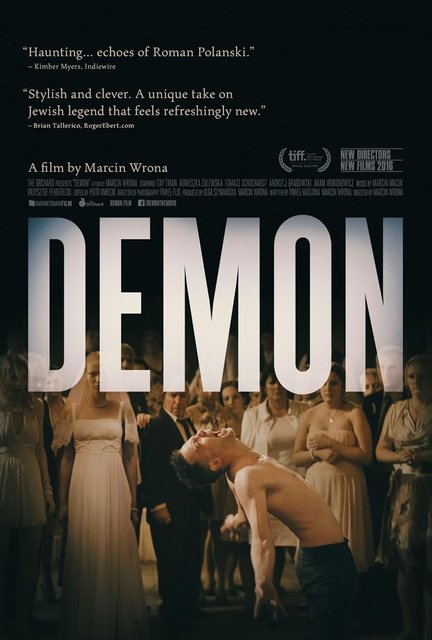
Watchlist Count : 452 (+/- 0)
Next : Baskin (2015)
Next : Baskin (2015)
Thank you very much to whomever inspired me to watch Demon
X
Favorite Movies
X
User Lists

DEMONS (1985)
(Dèmoni)
Directed by : Lamberto Bava
[center]


DEMONS (1985)
(Dèmoni)
Directed by : Lamberto Bava

I really like Demon. It was a film that was absolutely slammed by an IMDb hate campaign. (This has balanced out somewhat over time, but for a while a significant number of ratings were 0 and I think the average score of 6.1 is much lower than it should be).
Like you, I prefer the subtlety of the possession and the fact that it treads more in discomfort than overt horror. I think that the lead actor's physical performance is very effective, and the whole thing is eerie.
I'll be interested to hear what you think of Baskin. I was pleasantly surprised by it, and I can understand why some compare it to the Hellraiser films.
Like you, I prefer the subtlety of the possession and the fact that it treads more in discomfort than overt horror. I think that the lead actor's physical performance is very effective, and the whole thing is eerie.
I'll be interested to hear what you think of Baskin. I was pleasantly surprised by it, and I can understand why some compare it to the Hellraiser films.
X
Favorite Movies
X
User Lists
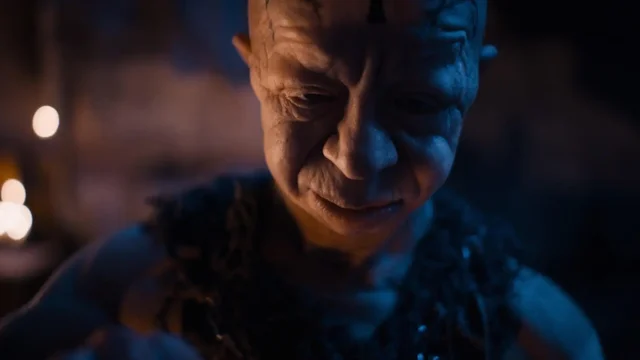
BASKIN (2015)
Directed by : Can Evrenol
Baskin delivers to it's audience a vision of hell that'll probably stay with whoever watches it for a while - visually inspired by the most evocative and surreal of artists - Caravaggio, Hieronymus Bosch and H.R. Giger. The unlikely group of inauspicious protagonists who end up there are a team of Turkish police officers - boss Remzi (Ergun Kuyucu), Arda (Gorkem Kasal) - who has been plagued by strange dreams, Yavuz (Muharrem Bayrak), Apo (Fatih Dokgöz), and Seyfi (Sabahattin Yakut). They answer a call for back-up, and are directed to the town of Inceagac - a place that already has a reputation as being strange and cursed. It's not long before they find themselves travelling a road they've never seen before, and come across a plague of frogs, townsfolk who seem to be from another time and place along with a long-deserted, derelict Ottoman-era police station. Inside is a fellow-officer who has apparently gone mad, and they'll soon regret investigating further - the law means very little to the entity known as Baba or, The Father (Mehmet Cerrahoglu), a disfigured leader of a devilish cult ready to torture the souls of these unfortunates.
Underpinning the superb horror artistry we're rewarded with in this movie is a nice kind of development that includes dreams and portentous signs. The movie starts with a surreal sequence that only becomes meaningful when Remzi is sitting and talking to Arda in a scene that is itself a dream sequence, and dreams in this film end up taking on a quality that make them an essential part of reality. You get a sense that the walls separating physical reality from every metaphysical realm have crumbled. "Hell is not a place you go to. You carry Hell with you at all times. You carry it inside you," Baba tells his captive audience, further underlining the exact kind of headspace the film wants you to be in. It's the perfect psychological setting for a really visceral, horrific and wonderfully designed series of shocks and grimy, filthy creations that will more than match our worst imaginings of what hell might be like. The casting of Mehmet Cerrahoglu, who has a rare skin condition that gives him a unique, unearthly look, was inspired - especially since the first time performer really nails his role as the dark, soul-crushing Father. I can't see anyone else being better for that specific part.
The world the police officers descend into reminded me of a darker, sexualized Silent Hill, but Can Evrenol mentions that he was inspired by such films as The Descent, Quest For Fire and Frontier(s) - the last two of which I haven't seen but look interesting. Of course, it's also very reminiscent of Hellraiser - especially considering that there's a central, all-knowing tormentor. Evrenol has also mentioned Apocalypse Now - and you'll notice a little Colonel Kurtz in Baba if you're looking out for it. The only aspect of the film as a whole for me that wasn't a home run was the ending, which seemed to be aiming more at being a clever twist than being a meaningful way to close proceedings - but that's an extraordinarily common feeling I have these days. Perhaps I'm expecting too much. Aside from that though, this was a great horror movie - our characters have distinct personalities which in many ways play on how they experience what they do, being very well written. The score is also absolutely brilliant by the way. So along with the amazing make-up effects and production design it delivers on most every front in an intelligent yet entertaining manner. I had a lot of fun watching it, and I'm sure it will maintain an enduring cult status for years to come.
Glad to catch this one - Can Evrenol won the Best New Director award at Fantasticfest for this, and The Director's Award at Mórbido Fest 2015.
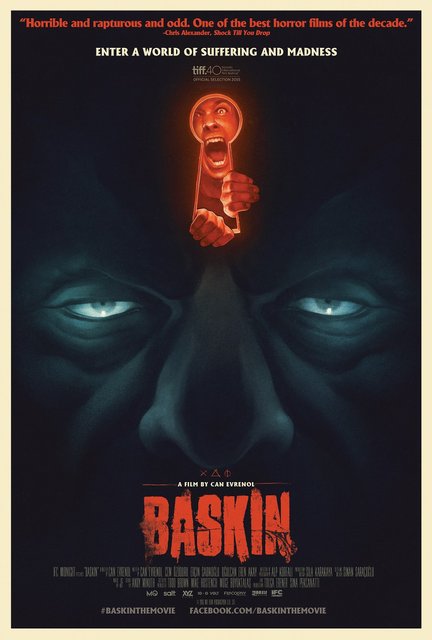
Watchlist Count : 451 (-1)
Next : Creepy (2016)
Next : Creepy (2016)
Thank you very much to whomever inspired me to watch Baskin
X
Favorite Movies
X
User Lists
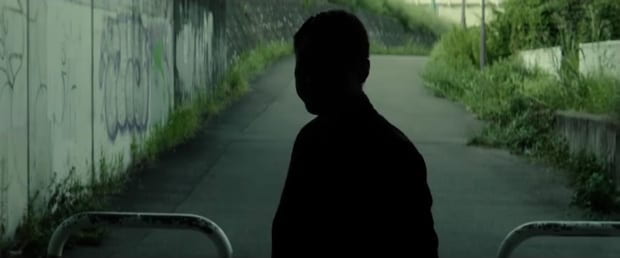
CREEPY (2016)
Directed by : Kiyoshi Kurosawa
Let me get this out of the way - Creepy is certainly creepy, but that's not me assuming that's why Kiyoshi Kurosawa gave this film the English-language title he did. Koichi Takakura (Hidetoshi Nishijima) is a former police profiler who decided on a career change after being injured by a demented killer on the job - he now teaches profiling and criminal behaviour at university level, and has moved into a new house with his wife Yasuko (Yūko Takeuchi). They try to make friends with their neighbours but find them stand-offish, although one - the strange Nishino (Teruyuki Kagawa) - is half ingratiating, half aggressive and always weird. In the meantime, at work, Takakura finds himself lured into investigating a cold case that involved the disappearance of a family from their home. Mother, father and son are assumed dead, and the surviving daughter seemingly remembers nothing about what happened. While exploring the long-abandoned house and questioning the girl, Saki Honda (Haruna Kawaguchi), Takakura's further encounters with neighbour Nishino create unease, discomfort and a sense that not all is well with his world.
Most fans of J-horror will certainly have had a memorable taste of what Kiyoshi Kurosawa is capable of with his two most famous horror classics, Cure and Pulse. Creepy certainly maintains that core aspect of unsettling panoramic views of seemingly cursed places, and the confined exploration of inner darkness - both literal and psychological. Tease a little information and suddenly what would be an ordinary shot of a street, house or group of houses feels like an uncomfortable night in a haunted cellar. Add what seems to be the ever-present presence of Nishino and our anxiety goes through the roof - Teruyuki Kagawa is absolutely extraordinary in this movie, and from the very first time you meet him you're both repelled and absolutely drawn to this magnetic, and conversely off-putting character. He exists side-by-side with a mystery that certainly sat in the corner of my mind and helped to make me feel jumpy yet desperate to know more. This is Creepy at it's best, but once the film really opens up and reveals it's inner workings - well, that's where moviegoers have been split as far as praise or criticism goes. It seems to depend on how hard you go on reality-testing the events that transpire in the film and the way the characters in it behave.
Creepy is a long movie - it morphs and changes, seeming to become a different creature at one point, going from psychological horror to thriller in the space of a heartbeat or two. I didn't mind that so much - you can only hold an audience in suspense for so long, and I was certainly glued to the screen up until the end credits. I never lost sight of just how enjoyable a character I was being presented with in Nishino, as absolutely infuriating Takakura and Yasuko were in their actions and behaviour. We slip from something that feels haunting and spooky right into visceral horror and more plot-driven mechanics - but the film never lets go of the thematic weight it gives to psychology and the mindset of serial killers as opposed to the mindset of those who are drawn to them through fascination rather than empathy for their victims. To me, that's the important part of the movie, and to get hung up on trying to orient the film world to the real world is simply a self-defeating exercise. I thoroughly enjoyed my time with it, and I'll be looking out for a copy to own because I would definitely enjoy experiencing it again.
Glad to catch this one - Kiyoshi Kurosawa won Best Director at the Fantasia Film Festival for Creepy. Other awards went to Teruyuki Kagawa for his performance and Akiko Ashizawa for her cinematography.
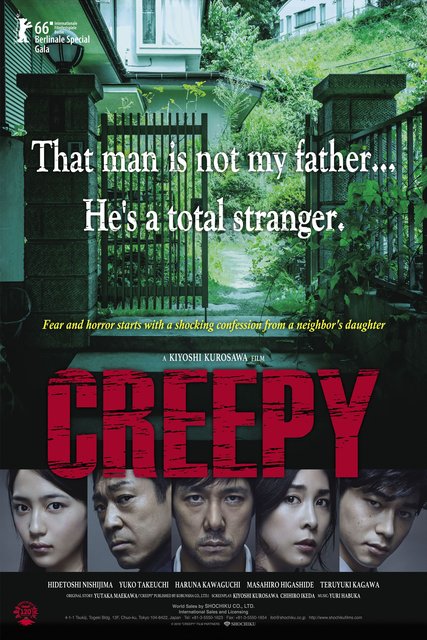
Watchlist Count : 450 (-2)
Next : Halley (2012)
Next : Halley (2012)
Thank you very much to whomever inspired me to watch Creepy
X
Favorite Movies
X
User Lists
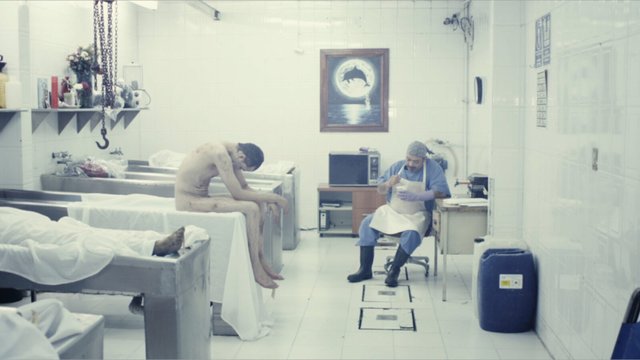
HALLEY (2012)
Directed by : Sebastián Hofmann
Immortality isn't all it's cracked up to be in Sebastián Hofmann's Halley, with it's central character, Aberto (Alberto Trujillo), struggling with his day-to-day life as a security guard having died some time ago. Low on energy, Alberto has to spend much of his time plugging awkward leaks and hiding the parts of his body that are visibly rotting - in the meantime he can no longer enjoy the pleasure of eating. He's retreated into a world dominated by loneliness and silence, despite the fact that his female boss, Silvia (Luly Trueba), is interested in him and is unrelenting in her determination to shake Alberto out of his seeming stupor. In the meantime a mortician posits that Alberto might still be around even when his body has completely decomposed - a ceaseless presence perhaps yearning for some kind of reconnection to the world of life and light. As entire appendages start to detach themselves from him, Alberto sets out to find a place that truly suits his forlorn and lost state of mind, where reminders of life are few and far between. It's a slow and steady meditation on isolation, depression, illness and the fact that many of us truly have died before our hearts stop beating finally.
I can see this obscure Mexican film not being for everybody, but it really resonated with me a lot because of it's meaningful look at withdrawal and seclusion via what is basically a zombie character, going through the motions of life while at the same time being dead. It's obviously slow paced and Alberto Trujillo's main occupation acting-wise here is in being still, measured, quiet and detached from all that's around him. Despite this detachment however, he still clings to what he once loved about life - for example, making a delicious plate of pancakes covered in syrup only to, in the end, throw the lot into the bin once he's sat and simply contemplated the act of eating. You can really feel his inertia as he drags himself around, but he retains the determination to keep up appearances - not at all interested in proclaiming himself a medical miracle. Body horror-wise, the first artist you'll think of is of course David Cronenberg, and there are scenes that mirror Seth Brundle's deterioration in his 1986 remake of The Fly (I can hardly believe that The Fly is nearly 40 years old now.) My most enduring memory of Halley though are the profile shots of Alberto Trujillo's impassive, empty face - a true portrait of complete alienation and a paralysis of personality.
The title Halley refers to Halley's Comet - the fact that it's 75-year cycle of returning to Earth is approximately that of a human lifetime, while it's eternal reoccurrence conversely forces us to ponder the comet's seeming immortality. (I was a kid in 1986, when Halley's Comet last visited and I wish I'd put more effort into getting a good look at it - I'm hoping I live long enough to get my second chance.) The movie paints immortality as something terrible that completely removes one from the human experience and places us at odds with the joy of truly living, like a sickness that drains from us what makes us unique and dynamic people, seizing every moment of pleasure and possibility of connection. I was also made uncomfortably aware of how much Alberto's death felt like a distillation of what we fear about ageing and becoming old - the physical deterioration and increasing isolation related to old age, including the fact we become too tired to do what once gave us the most joy, is almost like a living death. That's not to say that we're invariably defeated by that - I think there's some hope here that for many of us there is a moment when we make peace with our mortality and find a place where there's some kind of enlightened perspective. Halley simply gives us pause to think, and for a film that's the greatest of plusses.
Glad to catch this one - director Sebastián Hofmann won awards at the East End Film Festival, Munich Film Festival and Sitges Film Festival for this work. Matias Penachino won an award for his cinematography at the Durbin International Film Festival and Adam Zoller won an Ariel for his excellent make-up work.
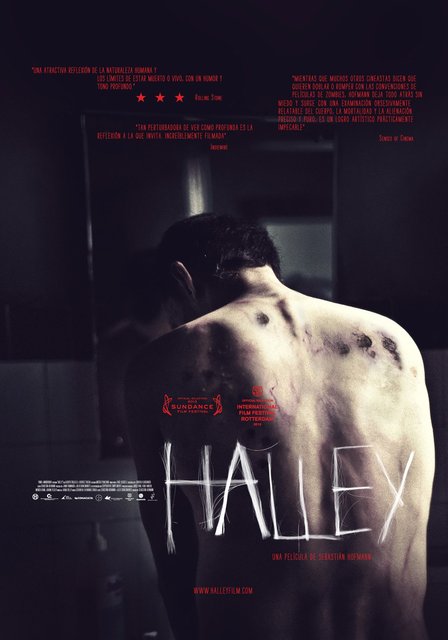
Watchlist Count : 449 (-3)
Next : Eye of the Devil (1966)
Next : Eye of the Devil (1966)
Thank you very much to whomever inspired me to watch Halley
X
Favorite Movies
X
User Lists
I think you'll end up enjoying Eye of the Devil. If only for the novelty of seeing David Niven in a horror mystery.
X
User Lists
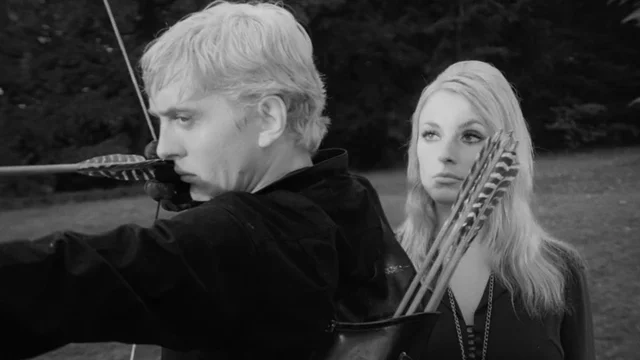
EYE OF THE DEVIL (1966)
Directed by : J. Lee Thompson
As soon as I saw the grapes withering on those vines - the last three year's worth of vineyard produce amounting to near nothing - I was pretty sure that someone was probably going to get the Wicker Man treatment here. Of course, in 1966 there was no Wicker Man for audiences to draw on, only the creeping atmosphere of a cult inhabiting Bellenac, the ancient estate and birthplace of Philippe de Montfaucon (David Niven), who has been summoned as the hereditary owner for a reason that is obviously grave and serious. His wife, Catherine (Deborah Kerr), takes it upon herself to drive there to see him - compelled by a dream their son Jacques (Robert Duncan) has had. She brings Jacques with her, along with daughter Antoinette (Suky Appleby). She's immediately the target of torment by Christian de Caray (David Hemmings) and his sister Odile (Sharon Tate), the latter of whom takes a malevolent interest in the children. Her unease increases after she witnesses an arcane ceremony involving black-robed figures, Philippe among them. A residing priest, Père Dominic (Donald Pleasence) instructs Catherine to ignore what's going on, while Philippe's aunt Estelle (Flora Robson) seems determined to avoid all of activity. Will Catherine try to uncover the truth, or should she flee with Jacques and Antionette while she still has the chance?
J. Lee Thompson has always struck me as one of the great journeyman directors of the 1960s - his fadeout in the 1970s and 80s a really unfortunate factor that tarnished his reputation. For a while he was getting his hands on some of the best screenplays going around, and while Eye of the Devil wasn't one of his box office successes, it's a fantastically well made movie that highlights the kind of form he was in when he made it. Everything is noticeably brilliant, and as such it's one of those "complete package" movies where each movie-making art backs up the whole - Gary McFarland's score is perfectly tuned to the eerie folk horror tale this is, and Erwin Hillier's cinematography covers a very wide range of mood-enhancing effects and dizzying, trance-like surreal moments. The combination of those two factors alone overshadow the fact that this is a movie where supporting players David Hemmings, Sharon Tate and Donald Pleasence are suitably restrained while the slightly miscast David Niven and Deborah Kerr in the lead roles get a little theatric. (I'd say to those who complain about Tate's performance being "expressionless" that her hypnotic Odile betrayed emotions with subtle grace while maintaining the mesmeric, spellbinding stare that was absolutely required for the role she had.)
I was mightily impressed with Eye of the Devil - shot at the Château de Hautefort, a really stunning location for what is a deeply uncanny, atmospheric movie about dark rituals, belief and pagan tradition. What's most impressive is how it predates so many similar films that count The Wicker Man as their pinnacle, and how it succeeds in imparting the same sense of mystery and makes us feel like we really are peeking under the secretive veil of a long-lost society that ascribes to polytheism, Devil worship and cult ceremony. Much of it is steeped in iconography and symbols that have the power they have because they seem to stir the ancient ghosts most of humanity have long stopped believing in since the dawn of the Age of Reason. (Interesting to note that Alex Sanders, an English occultist and Wiccan, was brought onboard as a consultant to give the pagan rites the needed authenticity.) From the editing to the set design and everything else I've already mentioned, the blended result is a surprisingly magnificent movie that gets nearly everything right from start to finish. It perhaps didn't have much of an audience back in the day, but I'm not surprised at it's cult credentials in this day and age.
Glad to catch this one - it was the last black and white film released by MGM, and I think black and white suits it's aura. Sharon Tate's cinematic debut.
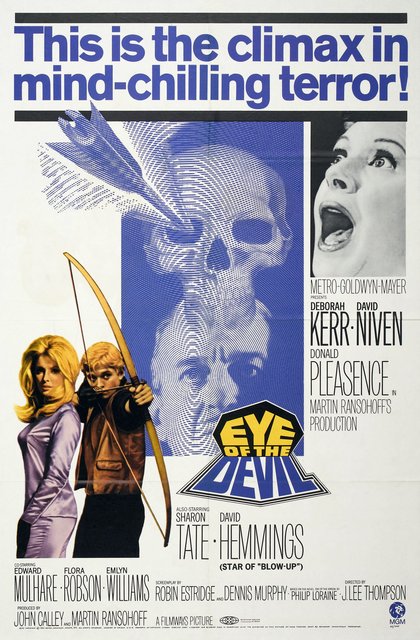
Watchlist Count : 449 (-3)
Next : Deranged (1974)
Next : Deranged (1974)
Thank you very much to whomever inspired me to watch Eye of the Devil
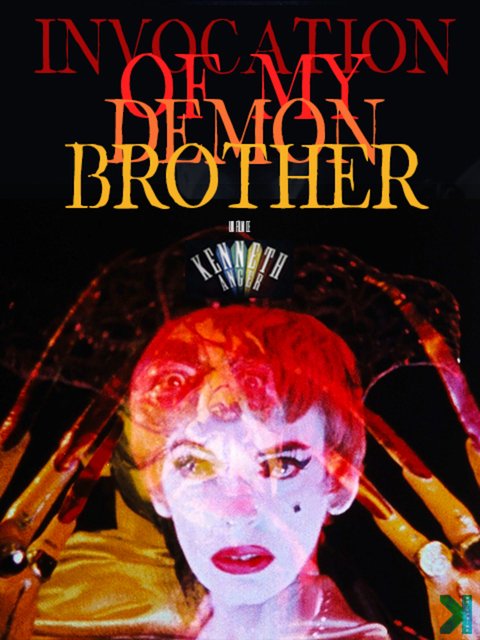
Bonus Watch : INVOCATION OF MY DEMON BROTHER (1969)
Directed by : Kenneth Anger
A collection of devilish sights and sounds that evoke Satanism along with The Rolling Stones and an original synthesizer score by Mick Jagger. I don't know what to make of that, but it went really well with Eye of the Devil.
No rating
X
Favorite Movies
X